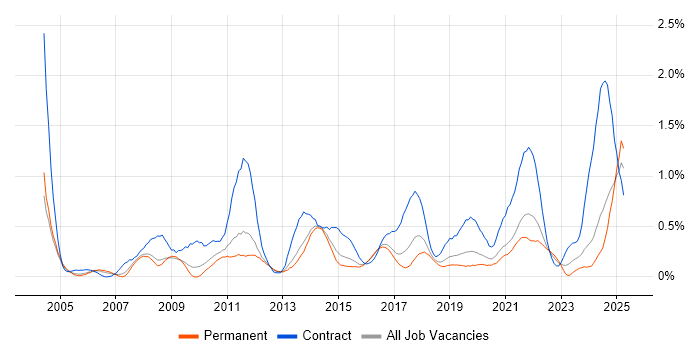Data Mapping
West Midlands > Birmingham
The table below provides summary statistics for permanent job vacancies advertised in Birmingham requiring Data Mapping skills. It includes a benchmarking guide to the annual salaries offered in vacancies that cited Data Mapping over the 6 months leading up to 7 June 2025, comparing them to the same period in the previous two years.
| 6 months to 7 Jun 2025 |
Same period 2024 | Same period 2023 | |
|---|---|---|---|
| Rank | 96 | 154 | - |
| Rank change year-on-year | +58 | - | - |
| Permanent jobs citing Data Mapping | 12 | 2 | 0 |
| As % of all permanent jobs advertised in Birmingham | 0.89% | 0.065% | - |
| As % of the Processes & Methodologies category | 0.93% | 0.083% | - |
| Number of salaries quoted | 12 | 2 | 0 |
| 10th Percentile | - | £46,398 | - |
| 25th Percentile | £44,000 | £48,457 | - |
| Median annual salary (50th Percentile) | £45,000 | £54,215 | - |
| Median % change year-on-year | -17.00% | - | - |
| 75th Percentile | £46,000 | £61,396 | - |
| 90th Percentile | £54,100 | £64,309 | - |
| West Midlands median annual salary | £45,000 | £47,965 | £67,500 |
| % change year-on-year | -6.18% | -28.94% | +35.00% |
All Process and Methodology Skills
Birmingham
Data Mapping falls under the Processes and Methodologies category. For comparison with the information above, the following table provides summary statistics for all permanent job vacancies requiring process or methodology skills in Birmingham.
| Permanent vacancies with a requirement for process or methodology skills | 1,287 | 2,410 | 1,736 |
| As % of all permanent jobs advertised in Birmingham | 95.55% | 78.89% | 96.66% |
| Number of salaries quoted | 694 | 1,925 | 1,307 |
| 10th Percentile | £32,500 | £32,000 | £32,426 |
| 25th Percentile | £42,500 | £40,988 | £42,500 |
| Median annual salary (50th Percentile) | £57,468 | £55,000 | £57,000 |
| Median % change year-on-year | +4.49% | -3.51% | +3.64% |
| 75th Percentile | £71,250 | £70,000 | £71,250 |
| 90th Percentile | £84,625 | £85,000 | £81,251 |
| West Midlands median annual salary | £52,500 | £50,000 | £52,500 |
| % change year-on-year | +5.00% | -4.76% | +5.00% |
Data Mapping
Job Vacancy Trend in Birmingham
Job postings citing Data Mapping as a proportion of all IT jobs advertised in Birmingham.

Data Mapping
Salary Trend in Birmingham
3-month moving average salary quoted in jobs citing Data Mapping in Birmingham.
Data Mapping
Salary Histogram in Birmingham
Salary distribution for jobs citing Data Mapping in Birmingham over the 6 months to 7 June 2025.
Data Mapping
Co-occurring Skills and Capabilities in Birmingham by Category
The follow tables expand on the table above by listing co-occurrences grouped by category. The same employment type, locality and period is covered with up to 20 co-occurrences shown in each of the following categories:
